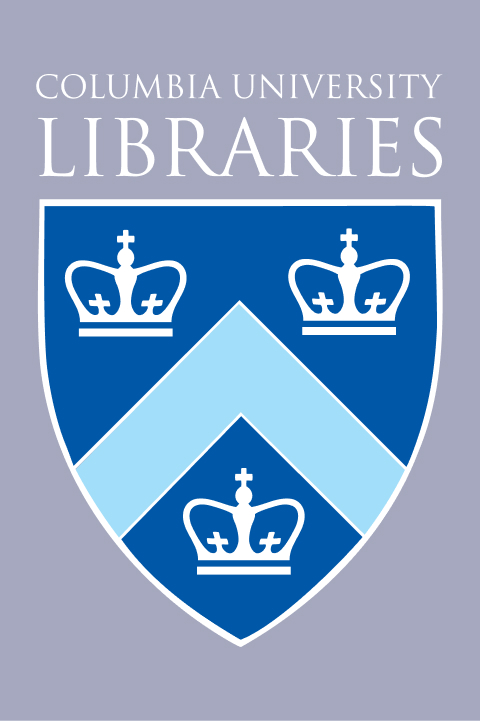African-American Studies
This document outlines the Libraries’ general policy on African American studies collecting, but it is not intended to be a rigid set of rules; suggestions from students and faculty are welcome. The Libraries’ collections support research and teaching on the history, historiography, and multi-disciplinary study of the experience of persons of African descent in the United States and Canada.
Some form of approach to African American history was included ever since American history began to be seriously researched and taught at Columbia. (We can date this roughly to the mid-19th century, when history itself as a discipline began to take on a recognizably modern form at American universities and when prominent faculty began to distinguish themselves in American history at Columbia). In 1896 (the year that Columbia’s Department of History was founded), the Libraries articulated goals that included building strong collections for American history. These collections were to include all important works, plus reprints and society publications.
Aside from the pioneering work of historians such as Carter G. Woodson (1875--1950), there was limited recognition up through the mid-20th century that the history of African American people should be studied for its own sake and/or in light of any expansive notion of American history and identity. By the 1960s and 1970s, transformative expansions in the ways that America’s past and present were conceptualized by historians led to the recognition that the role of African Americans (and of other groups) in the formation of American history had not been adequately addressed in prior historical practice. This led to new ways of writing and researching both American and African American history, as well as to new approaches that reached beyond history as a discipline.
The Institute for Research in African American Studies (IRAAS) is a multi-disciplinary enterprise that was founded at Columbia University in 1993 by the late Professor Manning Marable, who would go on, in 2002, to establish the Center for Contemporary Black History. Continuing in this spirit of growth, the University Senate unanimously voted, in September 2018, in favor of establishing a Department of African American and African Diaspora Studies (AAADS).
The Libraries’ collections provide substantial and wide-ranging support for research and teaching in African American studies. As the new Department of African American and African Diaspora Studies takes shape, conversations will be initiated between the Libraries and the department to ensure that support keeps pace with evolving needs.
While a very wide range of online resources is potentially relevant to research in African American studies, it is worth highlighting key resources providing access to publications written by, for, and/or about African Americans, including: African American Periodicals, 1825--1995, a collection based upon James P. Danky's African American Newspapers and Periodicals: A National Bibliography; Afro-Americana Imprints, 1535--1922, which includes hundreds of early works by authors of African or African American descent; and Black Thought and Culture.
Archives from the NAACP are accessible in digital facsimile format for the period of 1909 to 1972 through the NAACP Papers. An extensive and pioneering project for conducting and collecting streaming video oral history interviews that document and illuminate African American history is available in The HistoryMakers.
Columbia’s Rare Book & Manuscript Library (RBML) holds the David N. Dinkins and David Paterson papers, representing respectively the first black mayor of New York City and the first black governor of New York State. The papers of L. S. Alexander Gumby, who ran a prominent Harlem Renaissance intellectual salon and book center, include nearly two hundred scrapbooks covering various topics of the African American experience. RBML also holds the papers of C. L. R. James, Amiri Baraka, and Hubert H. Harrison.
Relevant materials in the social sciences and in recent international relations are housed in Lehman Social Sciences Library; works in religious history and theology are located at the Burke Library at Union Theological Seminary; works on art history, architecture, and urban planning are at Avery Architectural & Fine Arts Library; works and music materials may be found at The Gabe M. Wiener Music & Arts Library. All of these libraries keep some portion of their collections at a shared off-site storage facility (ReCAP). The American History & Literature Reading Room (502 Butler Library), which provides consistent access to a core body of non-circulating materials supporting advanced research, includes many materials relevant to African American studies.
a. Undergraduate
Columbia College (CC) or General Studies (GS) students with a major or concentration in African American studies; Department of History majors and minors; students with a major or concentration in ethnicity and race studies; CC, School of Engineering and Applied Science (SEAS), and GS students enrolled in American history or American studies courses.
b. Graduate and Professional Schools
MA students in African American studies; MA students in American studies; MA and PhD students in the Department of History.
c. Institutes, Interdisciplinary Programs, etc.
Center for American Studies; Center for Contemporary Black History; Center for the Study of Ethnicity and Race; Heyman Center for the Humanities; Institute for Research in African American Studies; Institute for Research on Women, Gender, and Sexuality; Institute of African Studies.
d. Course Reserves
Selection for course reserves is up to individual faculty members. The Librarian will do whatever is possible to secure specific materials absent from the collection.
a. Print
Current publications in African American studies are collected in substantial breadth and depth. Materials about the area currently known as the United States are prioritized. While thoroughness is aimed for in acquiring the relevant output of most American and British university presses, titles published by trade presses are collected more selectively. Materials about the region currently known as Canada are collected more selectively in general, with an emphasis on known areas of research interest (for example, the early Canadian region and “New France,” Native American studies, indigenous rights, settler colonialism, African American studies, and U.S./Canada relations). Works of Canadian local history that have relevance to known areas of research interest are collected along with more general works of Canadian regional or national history.
The Librarian collects widely in historical, interdisciplinary, and literary works supporting research in African American studies. Relevant works that fall more specifically into distinct disciplinary areas are collected by a range of librarians. For example, relevant works on music are collected by the Music Librarian and works in East Asian studies are collected by the East Asian Studies Librarian. The bulk of materials relating to African American studies are acquired for Butler Library.
b. Digital Collections
Every resource that is relevant for American history or American studies is also potentially relevant for African American studies (and vice versa). This includes all of the familiar main online corpora of primary sources in full-text digital facsimile format, for example: American Periodicals; Colonial America; ProQuest Congressional; Readex AllSearch; and Sabin Americana, 1500-1926.
Key resources providing access to publications by, for, and/or about African Americans include: African American Periodicals, 1825--1995, a collection based upon James P. Danky's African American Newspapers and Periodicals: A National Bibliography; Afro-Americana Imprints, 1535--1922, which includes hundreds of early works by authors of African or African American descent; Historical Black Newspapers; and Ethnic newsWatch, which includes articles from a substantial range of African American news periodicals from 1959 to the present.
The most substantial online collection of documents relating to slavery in the Atlantic world is Slavery & Anti-Slavery: A Transnational Archive. While this includes documents exemplifying African American involvement in the movements to abolish slavery, databases are also accessible that focus more specifically on these efforts, for example, The Black Abolitionist Papers and the module in Accessible Archives devoted to African American newspapers, with content spanning from the early nineteenth to the early twentieth centuries.
Archives from the NAACP are accessible for the period of 1909 through 1972 through the NAACP Papers. Community activities for selected cities and towns may be studied at a relatively micro-level in African-American Communities, which includes documents drawn from a number of special collections.
Black Thought and Culture remains a significant resource for non-fiction works. Alexander Street Literature presents “literatures of place, race, and gender” in English and in other languages of authorship, through modules such as Black Women Writers: African, African-American, and Diaspora.
c. Media
A significant collection of feature films and documentaries by or about African Americans is available on DVD and VHS in the Butler Media Collection. The Librarian for Butler Media, Film Studies, & Performing Arts is primarily responsible for collecting media in these areas.
The Libraries also provide access to a varied range of streaming-video and still-image databases relevant to research in African American studies. The HistoryMakers provides access to a substantial and growing streaming-video oral-history archive compiled to document and illuminate African American history. Online collections such as Meet the Press (1947--2013) and Time Inc.'s newsreel series The March of Time (1936--1967) provide firsthand moving-image access, with searchable transcriptions, to some of the ways in which key 20th-century events were represented and debated. LGBT Studies in Video provides access to documentaries, interviews, archival footage, and select feature films exploring LGBTQ history and culture. Substantial collections of still images include ARTstor, Associated Press Images, and Serial Set Maps, which provides easy geographic, subject, and caption access to maps published in U.S. Congressional publications from 1817 through 1994. The Music & Arts Library maintains impressive collections of audio recordings of works by American composers as well as scholarship about them.
d. Languages Collected
Primary source materials are collected in languages in which they were originally published (for example, Spanish, French, etc.) and/or in English translation. Secondary literature is not systematically collected in languages other than English.
e. Chronological Focus
15th century through the present day.
f. Geographical Focus
The United States and Canada.
g. Imprint Dates Collected
The main focus of collecting is current and recent (+/- three years) imprints. When antiquarian acquisitions are offered via gift or purchase, no specific chronological ranges are established in advance; rare or unique materials from any period may be considered.
The Rare Book & Manuscript Library (RBML) holds significant collections supporting research in African American studies. These include the papers of C. L. R. James and Amiri Baraka. The papers of political leader Whitney Young, who directed the Urban League in the 1960s, are at Columbia, as is important correspondence from Southern civil rights pioneer Booker T. Washington.
The David N. Dinkins and David Paterson papers, representing respectively the first black mayor of New York City and the first black governor of New York State, form two important collections of Harlem political history. Both of these political leaders have longtime connections to the university.
Among the most significant scholarly resources held at Columbia University Libraries related to Harlem history are the L. S. Alexander Gumby papers and the Hubert H. Harrison papers. Gumby ran a prominent Harlem Renaissance intellectual salon and book center. In an attempt to address the lack of interest in black life, which he perceived among mainstream historians, he created nearly two hundred scrapbooks covering various topics of the African American experience. Hubert H. Harrison came to Harlem from the West Indies in the early 20th century and quickly became a leading book reviewer, social theorist, and educator. The Libraries’ purchase of his surviving papers about a decade ago, along with the work of scholars, has led to a recent and much-deserved new appreciation of his legacy and contributions to the Harlem Renaissance and what was known as the New Negro Movement.
Harlem’s intellectual and creative leaders interacted frequently with Columbia faculty and administration; through these connections many of their important works came to reside within the University Archives. Unique correspondence and memoranda from W. E. B. Du Bois, Alain Locke, Claude McKay, James Weldon Johnson, A. Philip Randolph, and others were acquired in this way.
The birthplace of the discipline of oral history, the Oral History Archives at Columbia hold one of the largest collections of these materials in the nation. Included among the transcripts are the oral histories of Samuel Battle and Ben Ward, the first black police officer and police commissioner, respectively, in New York City history. Other individual oral histories detail community activism, including radical organizing such as the Black Panther Party and 1960s student movements. Significant collections include the Black Journalists and Apollo Theater oral history projects.
a. Consortia and Collaborative Collecting with Other Institutions
The range of print materials supportive of research in African American studies is greatly enhanced by Columbia’s participation, with Harvard University, Princeton University, and The New York Public Library, in a shared off-site storage facility (ReCAP); Borrow Direct; and the Manhattan Research Library Initiative (MaRLI), a partnership with New York University and The New York Public Library.
b. Location Decisions and Selection for ReCAP
Most current publications (+/- three years) for the historical, interdisciplinary, and/or literary aspects of African American studies are acquired directly for the Butler stacks. After a specified period of non-circulation (currently five years), titles become identified as candidates for transfer to ReCAP. The Librarian reviews lists of ReCAP candidates, exercising the ability to override automatic transfer of any given title to ReCAP. Review is done with the aim of maintaining a reasonable onsite browsing collection. Older titles in the Butler stacks are also identified as candidates for transfer to ReCAP through the same criterion of circulation inactivity. These transfer lists are also reviewed by the Librarian. With older titles, the aim of retaining onsite significant works of known ongoing importance is key.
Duplication of recent publications (+/- ten years) is generally limited to works identified by faculty as being central to a specific course. In these cases, no more than a few copies are obtained, one of which should be placed by the faculty member on reserve. Duplication between titles in the American History & Literature Reading Room and other Columbia University Libraries locations is allowable since the reading room houses a non-circulating collection, which is maintained to provide consistent access to a core body of materials supporting advanced research in these areas. Works in demonstrated high demand that are unavailable in e-book format may also be considered for duplication in print.
Deduplication only takes place when a title has been identified for relocation to ReCAP and a copy already exists on shelf in the shared collection at that facility. Even in this instance, the Librarian will inspect the local copy for any unique features, unusual provenance, or more general artifactual significance, before assenting to deduplication.
c. Deaccessioning
Titles are deaccessioned only in cases where the physical copy is disintegrating and no longer serviceable in print format. In these instances, either a preservation photocopy is made, or a digital surrogate created or obtained. Books located in RBML are not deaccessioned.
d. Digitization and Preservation
The Libraries’ Preservation & Digital Conversion Division (PDCD) regularly evaluates materials in the collections for preservation and digitization. Materials digitized by PDCD are accessible through CLIO, the Libraries’ online catalog, and are also made accessible through Google Books or the Internet Archive.
A number of significant digital projects have originated from RBML. Notable New Yorkers offers transcripts of interviews with ten influential New Yorkers, drawn from the collections of the Oral History Research Office. These include prominent African American psychologists Mamie Clark and Kenneth Clark, who dedicated their work to the cause of racial justice. Sydney Howard Gay's "Record of Fugitives" is a treasure trove of information about how and why slaves escaped, who assisted them, and where they were sent from New York. This site allows the two notebooks of the record to be explored in detail, through high-resolution images, transcriptions, and explanatory notes. Community Service Society Photographs is an online presentation of almost 1,400 photographs (and a few illustrations) from the Community Service Society Records at RBML. They offer representations of urban poverty, unsafe tenement housing, inadequate hygiene in public areas, and other pressing social issues in late 19th- and early 20th-century New York. The images range from the 1880s through the 1950s and may be searched by race or ethnicity of subjects portrayed.

John L. Tofanelli
British and American History and Literature Librarian
- Humanities & History

Thai S. Jones
Lehman Curator for American History; Lecturer in History
- Rare Book & Manuscript Library

Kimberly Springer
Curator of Oral History
- Columbia Center for Oral History Archives
- Rare Book & Manuscript Library
African Studies (Sub-Saharan Africa) Collection Development Policy
Middle East and Islamic Studies’ Collection Development Policy
African American Studies Collection Development Policy
Latin American and Iberian Studies Collection Development Policy
English Language and Literature
Fine Arts